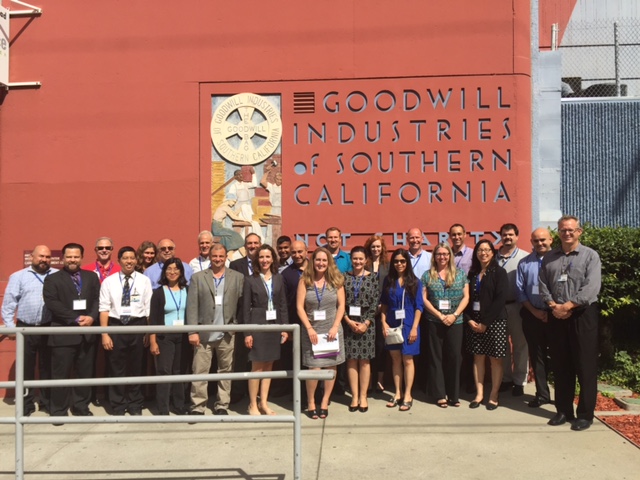In late September, HPRC convened its fall meeting in California, kindly hosted by Kaiser Permanente and Goodwill Industries. Besides the usual council meetings, we were pleased to facilitate a hospital roundtable to help foster connections and recycling insights within the region. The informal theme of the session became innovation, as we know the issues of hospital plastics recycling are complex and require creativity to address, and we were excited to hear about all the creative solutions hospitals are trying.
Goodwill to the Rescue
Goodwill, besides being our host, offered a glimpse into a one unique solution for a common hospital recycling issue—the need to manually separate components of recyclable materials in order for them to be successfully processed by the recycler. Recyclers are often uninterested in taking on this step themselves, yet hospital staff are also overtaxed and burdened with many other responsibilities and can’t spare the time either. Enter Goodwill of Southern California, who, in the context of their relationship with Kaiser, is able to step into the gap and provide the resources to do that manual separation, freeing and smoothing the flow of materials from hospital to Goodwill to recycler.
(We’re planning a deeper dive into this model and the work Goodwill is doing in a future post, so stay tuned!)
Keeping it LEAN
Another approach discussed during the meeting was the idea of applying LEAN and 5S principles to the hospital setting and, by extension, solving some of the challenges of implementing a robust recycling program.
LEAN, while not itself new, provided inspiration to participants by way of a case study of how LEAN has made a huge difference, both in terms of productivity and culture, in the Kaiser wood shop. This approach shows promising applicability to small, crowded clinical settings, where space for recycling bins is a real barrier. Having a place for everything can make the recycling process much more streamlined and simple, and the extra space gained (both in the clinical spaces and in supporting locations like loading docks) can make all the difference in getting a recycling program off the ground and running smoothly.
The Chicago Pilot Project
A third path to innovation came by way of HPRC’s Chicago regional pilot project, which strives to facilitate the type of regional cooperation often needed to produce the quantities of materials recyclers require and to coordinate the logistics involved. The project, the first of its kind, is drawing to a close, and we anticipate the learnings and insights gained from that work will be invaluable to other hospital systems and regional networks looking to that kind of partnership as a possible avenue to expand their programs.
Having undertaken a project of this magnitude was itself a great motivator to HPRC members and guests, and there will be much more yet to come at the project’s formal close as we really dig into the results of our efforts.
Spring Forward
With so much to look forward to and so many exciting new ideas percolating, we’re already anticipating our spring 2017 meeting, which will be held in Minneapolis in conjunction with the 2017 CleanMed Conference.
If you are planning on attending CleanMed and/or are interested in being part of future HPRC roundtables or other activities, please contact us for more information. We’d love to see you there!

